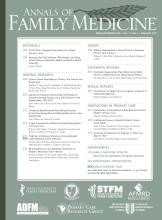Abstract
PURPOSE This study explored the influence of trait anger and long-term psychological stress on progression to hypertension and incident coronary heart disease (CHD) in persons with prehypertension.
METHODS A secondary data analysis was performed using the Atherosclerosis Risk in Communities (ARIC) study, a cohort of men and women aged 45 to 64 years at enrollment. Participants with blood pressures in the prehypertension range at the second visit conducted between 1990 and 1992, free of heart disease or stroke, and observed through the end of the ARIC study (1996–1998) were included (N = 2,334). The main outcomes were progression from prehypertension to hypertension and prehypertension to CHD or CHD death.
RESULTS After adjusting for various covariates, high levels of trait anger, compared with low/moderate levels (odds ratio [OR] 1.53; 95% confidence interval [CI], 1.05–2.24), were associated with progression from prehypertension to hypertension. After stratifying on sex, trait anger was predictive for men only (OR 1.71; 95% CI 1.04–2.83). In survival analysis, trait anger was associated with progression to CHD for men (hazard ratio [HR] 1.92; 95% CI, 1.07–3.54). Long-term psychological stress was also associated with risk of incident CHD (HR 1.68; 95% CI 1.18–2.40).
CONCLUSIONS High levels of trait anger in middle-aged prehypertensive men were associated with increased risk of progressing to hypertension and incident CHD. Long-term stress was also associated with increased risk of incident CHD in both men and women.
Footnotes
-
Conflicts of interest: none reported
-
Funding support: Supported in part by grants 1D12HP00023 and 1D14HP00161 from the Health Resources and Services Administration.
This paper was presented as a distinguished paper at the North American Primary Care Research Group meeting, Tucson, Arizona, October 2006.
- Received for publication September 18, 2006.
- Revision received March 3, 2007.
- Accepted for publication March 25, 2007.
- © 2007 Annals of Family Medicine, Inc.







